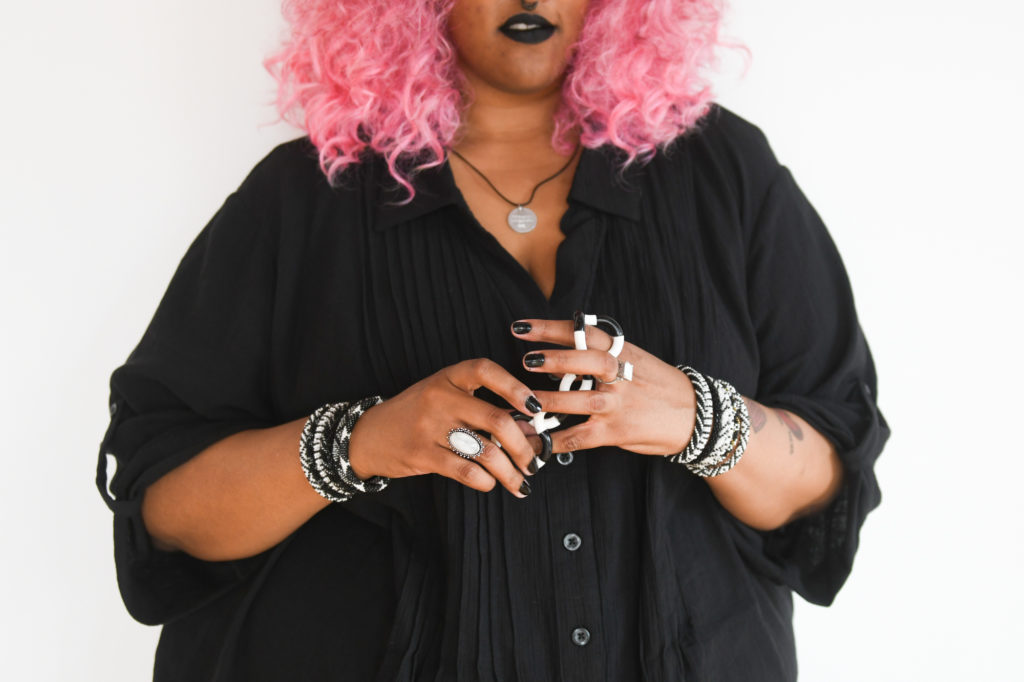
Photo featuring a close-up of a Black and Indigenous autistic non-binary person with pink ombré hair, black lipstick, black nail polish, tattoos, and bracelets using a tangle stim toy by Chona Kasinger for Disabled and Here, a publisher of free stock photos featuring and celebrating disabled BIPOC in the Pacific Northwest.
By Bryan Garcia he/him/his
Some folks tend to think of safety in terms of protection from physical harm, but our mental and emotional well-being is also important and worth taking the steps necessary to reduce harm. As the holidays inch closer, our anxiety levels may begin to spike because we are that much closer to potentially visiting family and family friends who harbor heavy ‘isms’ and ‘phobias’. Emotional safety planning can help us feel a stronger sense of trust in ourselves as we become more aware of our boundaries, triggers, support system, and coping strategies and options to create peaceful spaces for ourselves and navigate spaces where we may not feel all that much peace.
Writing your personalized plan down on paper, a note in your phone, or anywhere that is easily accessible can help. Here are some things you can start thinking about:
Your Triggers/Warning Signs
Ask yourself what happens to your body and thoughts when you are not okay? Does your heart begin to race and face become flushed? Identifying these triggers or warning signs can prove helpful so you are able to know when it is your cue to excuse yourself, step away and get some air.
“Some of the things that set off or increase my trauma reactions are ________”
Redirect Conversations
You don’t owe anyone an explanation, energy or time. Be ready to disengage and talk about that show you know everyone likes, or songs everyone is listening to, someone’s new job, favorite holiday memory, dream vacation, etc. Disengaging can be as simple as saying, “It’s great that we all have so much to say about this topic, we should definitely find some time to talk more about this at length tomorrow? On another note, I’ve been meaning to ask you all what you thought about ______?” (You don’t actually have to follow up with the conversation the next day.)
“Some things I can change the topic to could be _________”
Support System
No one should have to go through the holidays alone, so it can be helpful to find someone you trust and can talk about your thoughts, feelings, and reactions with. It can also help to have back-up support. Lean on those who can validate your emotions and what you are going through and help you return to a calmer emotional state. Let them know ahead of time that you will be in this sort of situation and may need extra support. You can also offer to be their text or call support when if they might be in a similar situation. You don’t have to talk about the details of what is going on, it could be anything else that helps you feel more grounded. This can also be someone you can ask for help to make your personalized plan.
“One person I can reach out to when I need support is _________”
Coping Strategies
What are things you can do to help you feel good and relax when you don’t feel well or start to get panicky? Where is the closest empty room? A far off bathroom you can occupy for a couple of minutes? Depending on the weather, a nice spot outside you can hang at while you regain some balance? Watch that funny youtube video, go for a walk, play a game on your phone (headphones in) or a deep breathing meditation app.
“Some of the things I can do to become grounded are ________”
Not going anywhere?
Many of us have decided to stay put this year and made the choice to not visit our families this year. Or we may find it difficult to decide how we are going to spend this time considering that we are still very much in a pandemic. Use this time for your growth, healing and rest. Organize a personal retreat for yourself or dedicate the time off or evening to your well being. A desire for a family that “ stays together” can bring about some mixed feelings about your decision. Remind yourself that it is okay to love someone and still be able to set boundaries and be at a distance. You may get messages from these same folks saying that they “miss you” and make feelings of guilt stronger, but you haven’t done anything wrong. On the contrary, you’re giving yourself the loving kindness you deserve and you are also protecting people who are at high risk, like elderly family members, and immunocompromised or uninsured folks.
What can be considered emotional safety for one person, may not work for everyone else. The goal is for you to be able to trust yourself and embrace your wonderful self in all your facets which include your emotions and choices when it comes to how you navigate difficult situations. The holidays have the potential to be an unwelcoming environment where many queer people of color are overwhelmed by the toxic combination of present day hurt, past trauma, and unhealthy family history. No matter the reason, you deserve to be able to feel good about whatever decision you make surrounding your holiday plans or lack thereof.
Join us on Thursday, November 19th at 6 pm to take part in our conversation on “Emotional Safety Planning for the Holidays” and bring a friend! Register here.


